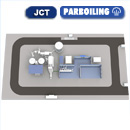In the lush green fields of rural landscapes, a quiet revolution has taken place - the evolution of rice machinery. From humble beginnings of manual labor to the modern marvels of technology, the transformation of agricultural practices has brought about a new era of productivity and efficiency. Join us on a journey through the history of rice machinery, as we explore the innovations that have shaped one of the world's most important crops.
The Rise of Mechanized Rice Farming
Rice farming has undergone a significant transformation in recent years with the advent of mechanized farming equipment. Gone are the days of manual labor in the fields, as modern machinery has revolutionized the way rice is grown and harvested. The evolution of rice machinery has led to increased efficiency, productivity, and overall crop quality.
One of the key benefits of mechanized rice farming is the ability to plant and harvest crops on a much larger scale than ever before. With the use of advanced machinery such as rice transplanters and combine harvesters, farmers are able to cover more ground in less time, resulting in higher yields and profits. Additionally, the use of precision agriculture technologies has allowed for better management of resources such as water and fertilizers, leading to more sustainable farming practices. is not just a trend, but a true agricultural revolution that is shaping the future of food production.
Innovative Features of Modern Rice Machinery
One of the most is the utilization of advanced technology such as GPS tracking. This allows farmers to precisely plant and harvest their crops, increasing efficiency and yield. In addition, many modern rice machines are equipped with sensors that can detect soil conditions and adjust planting depth and seed spacing accordingly. This not only saves time and labor but also ensures optimal growth conditions for the rice plants.
Another groundbreaking feature of modern rice machinery is the integration of automation and robotics. Machines can now perform tasks such as weeding, fertilizing, and even harvesting with minimal human intervention. This not only reduces labor costs but also increases the accuracy and consistency of the farming process. Additionally, some machines are now equipped with artificial intelligence that can analyze data and make real-time decisions to optimize crop production. With these innovative features, modern rice machinery is revolutionizing the way rice is cultivated, making farming more efficient and sustainable than ever before.
Enhancing Efficiency and Sustainability in Rice Production
Rice production has come a long way since the early days of manual labor in the fields. With advancements in technology and machinery, the agricultural industry has seen a significant shift towards efficiency and sustainability. The evolution of rice machinery has brought about a modern agricultural revolution, transforming the way rice is cultivated and harvested.
Today, farmers have access to a range of innovative equipment that helps streamline the production process, reduce waste, and minimize environmental impact. From precision seeders and crop monitoring drones to automated harvesters and rice transplanters, these tools are revolutionizing the way rice is grown. With the help of these modern machines, farmers can achieve higher yields, reduce labor costs, and improve overall sustainability practices in rice production.
Future Prospects of Rice Machinery in Agricultural Revolution
The use of rice machinery has significantly changed the landscape of agriculture, particularly in rice-producing regions around the world. With advancements in technology, modern rice machinery has revolutionized the way rice is planted, cultivated, and harvested. These innovative machines not only increase efficiency and productivity but also reduce the labor required in rice farming operations.
As we look towards the future, the prospects of rice machinery in the agricultural revolution appear promising. With the increasing global demand for rice and the push for sustainable farming practices, there is a growing need for advanced rice machinery that can meet these challenges. From precision planting to automated harvesting, the evolution of rice machinery continues to drive the modernization of rice farming, making it more efficient and environmentally friendly.
Concluding Remarks
In conclusion, the evolution of rice machinery has proven to be a critical component in the modern agricultural revolution. With advancements in technology and engineering, farmers are now able to cultivate and harvest rice more efficiently and effectively than ever before. From the traditional hand methods to the innovative machinery of today, the evolution of rice equipment demonstrates the continual progress and innovation in the agricultural industry. As we look towards the future, it is clear that the evolution of rice machinery will continue to play a crucial role in shaping the way we grow and harvest food around the world.

